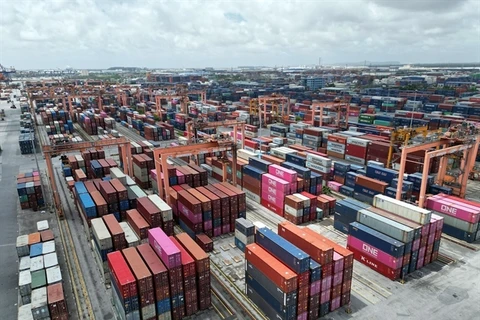
Hanoi (VNA) – Nearly 90% of businesses in Vietnam expressed their interest in venturing overseas, with the Association of Southeast Asian Nations (ASEAN) being the top market for expansion over the next three years, the UOB Business Outlook Study 2024 has revealed.
The study, which surveyed more than 4,000 businesses in seven key markets across ASEAN and China, including 525 businesses in Vietnam, found that most companies in Vietnam remain optimistic about the current business environment.
Nearly 90% of businesses in Vietnam expect a positive outlook in 2024, with improved business performance. To this end, businesses are looking to adopt digital solutions, upgrade equipment or facilities to improve productivity and diversify sales channels to drive growth.
About 60% of businesses surveyed in Vietnam said that their top motivator to expand overseas is to grow revenue. Cross-border digital trade platforms are a popular means of overseas expansion, with more than nine in 10 businesses showing interest in using them.
Regarding regions where businesses in Vietnam see viable overseas ventures in the next three years, ASEAN is the top choice, with nearly seven in 10 businesses wanting to expand in this region. Mainland China is the second key market, with 37% of businesses preferring to venture into this country. Within ASEAN, Thailand is the most important country for businesses in Vietnam, followed by Singapore, Malaysia, and Indonesia.
However, overseas expansion is challenging due to several main barriers, including a lack of customers in the new markets (41%), lack of legal, regulatory, compliance, and tax support (39%), and difficulty in finding the right partners to work with (38 %).

To successfully expand into overseas markets, businesses are expecting financial support such as tax incentives or rebates (42%) and funding or grants available for new markets (40%). More than 40% are also looking for non-financial support, like connections to large corporate businesses that are prospective anchor clients their company can supply to in overseas markets, according to the study.
The study showed that many businesses have adopted digitalisation in at least one department. About 41% of businesses have digitalised the entire business, the highest rate in the region. At the same time, over 80% are planning to spend more on their digitalisation efforts in 2024, with most budgeting an increase of 10-25%.
However, businesses expect to face several challenges, including cybersecurity concerns, lack of digital skills among employees, and increased risks of data breaches.
Businesses said they want more tax incentives/rebates, connections to the right technology and solution providers, and training programmes to reskill/upskill employees to adopt digitalisation.
High awareness of sustainability
Sustainability is considered important by 94% of the businesses surveyed in Vietnam.
More than half of the businesses see value in sustainability adoption to improve reputation, better branding, and improving the ability to attract investors. However, top barriers holding back higher adoption of sustainability include a lack of proper infrastructure for renewable energy (38%), a lack of good options for sustainable financing (34%), and concerns about negative impacts on profits (34%).
According to Lim Dyi Chang, country head of Commercial Banking, UOB Vietnam, UOB is helping to drive businesses in Vietnam towards faster and wider adoption of sustainability practices, adding that their effort is aligned with the country’s sustainability agenda to achieve net zero by 2050.
The UOB Business Outlook Study 2024 (SMEs & Large Enterprises) aims to understand the business outlook and key expectations among SMEs and large enterprises across seven markets, including Singapore, Indonesia, Malaysia, Thailand, Vietnam, mainland China, and Hong Kong./.






















